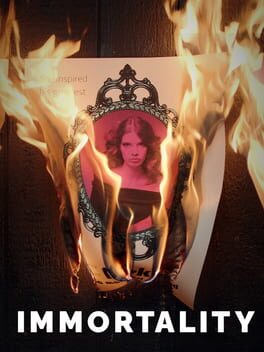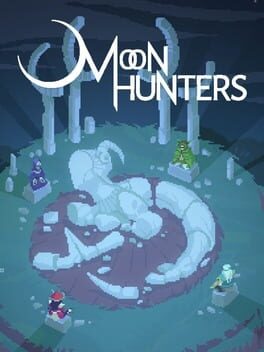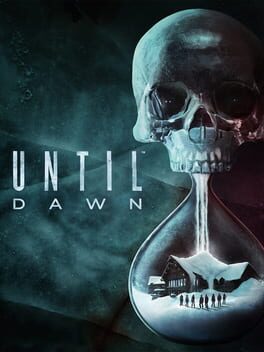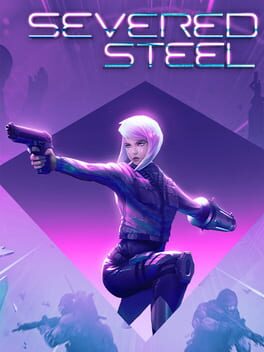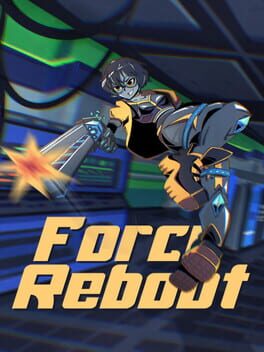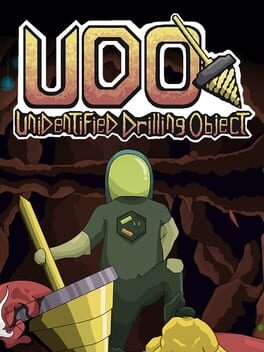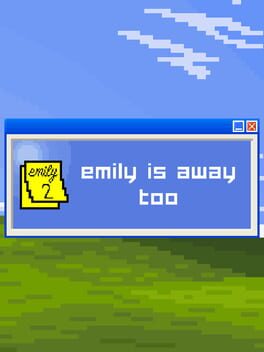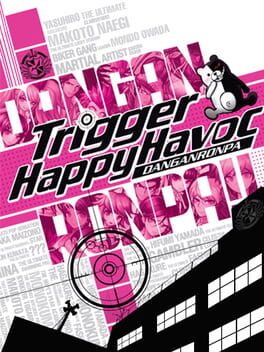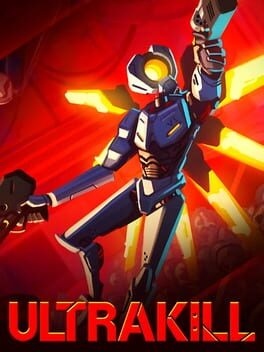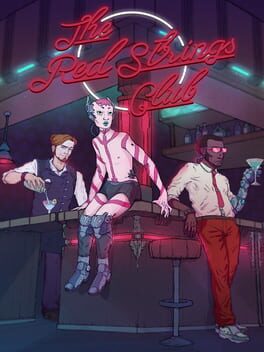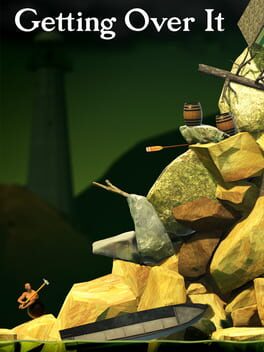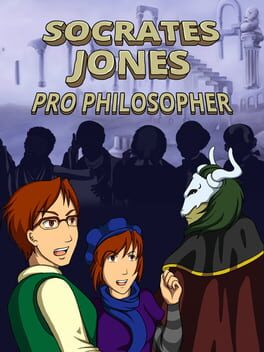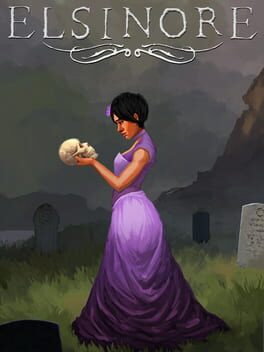MisterProject
2010
2022
This game is good, there's no doubt about that - from the moment I first opened it, I couldn't take my eyes off the screen or my mind off its narrative. My phone kept running out of battery and I absolutely refused to let go of it, even having to contort myself to stay near the electrical plug.
I'm not a movie buff or anything like that, but I am a fan of getting to know how the sausage gets made. Telling the narrative through this documentary-esque medium, blending finished movie scenes with behind-the-scenes cuts and interviews... this dance around the fourth wall is just very entertaining. Like I'm there with the characters, as a part of the crew.
There's also the secret scenes. Ominous, tricky to find at first, very confusing. The underlying narrative surrounding them is very intriguing, though even without the actual story, just the inclusion of these scenes in the game turns this slightly mundane collection of clips into a haunted house. It's a carrot on a stick, something to look forward to, to piece together.
I liked this game.
I'm not a movie buff or anything like that, but I am a fan of getting to know how the sausage gets made. Telling the narrative through this documentary-esque medium, blending finished movie scenes with behind-the-scenes cuts and interviews... this dance around the fourth wall is just very entertaining. Like I'm there with the characters, as a part of the crew.
There's also the secret scenes. Ominous, tricky to find at first, very confusing. The underlying narrative surrounding them is very intriguing, though even without the actual story, just the inclusion of these scenes in the game turns this slightly mundane collection of clips into a haunted house. It's a carrot on a stick, something to look forward to, to piece together.
I liked this game.
2016
2015
It's personally not my vibe, but my boyfriend loved it. It's very trope-y, but for a horror movie fan, just the experience of being able to control the narrative really enthralled him. The totems are a good design idea to make the game fairer while not being so on-the-nose with foreshadowing, though sometimes I did disagree with the scenes they reveal, as some don't help much.
It's a good experience for sure, though I'm not sure how much it will hold up in subsequent playthroughs, as the narrative doesn't change as much as it implies to change. As much as Detroit Become Human's race allegory fails, I do think that that game excels at actually giving the player choices that matter, and as such, Until Dawn kinda pales in comparison.
It's a good experience for sure, though I'm not sure how much it will hold up in subsequent playthroughs, as the narrative doesn't change as much as it implies to change. As much as Detroit Become Human's race allegory fails, I do think that that game excels at actually giving the player choices that matter, and as such, Until Dawn kinda pales in comparison.
2021
Admittedly the slow motion mechanic makes this game pretty much trivial to complete, but honestly, I don't really care.
This game is fun. 'Cathartic escapism', the title of its last level, is probably the best way to describe it. Almost nothing can stop you - enemies have no collision, doors can be kicked open, and all walls are destructible by the player's arm cannon.
The moment that encapsulated the game for me was when I double-jumped onto another building, blew open the fucking wall with my fucking gun, slid behind the entire enemy barrage and proceeded to slow-mo headshot every enemy in that room.
Nowadays, I mostly play Severed Steel as a podcast game. Doing these stunts, breaking these walls... it's entrancing. Movement shooters tend to be fairly sweaty (which I appreciate!), but I'm actually glad this game goes a different direction.
This game is fun. 'Cathartic escapism', the title of its last level, is probably the best way to describe it. Almost nothing can stop you - enemies have no collision, doors can be kicked open, and all walls are destructible by the player's arm cannon.
The moment that encapsulated the game for me was when I double-jumped onto another building, blew open the fucking wall with my fucking gun, slid behind the entire enemy barrage and proceeded to slow-mo headshot every enemy in that room.
Nowadays, I mostly play Severed Steel as a podcast game. Doing these stunts, breaking these walls... it's entrancing. Movement shooters tend to be fairly sweaty (which I appreciate!), but I'm actually glad this game goes a different direction.
2022
This might be a bit unfair to say, but honestly, I'd rather just play Ultrakill.
This game isn't bad by any means - the game feel is pretty good - but the upgrades aren't very meaningful, the weapons are barebones, the enemies don't have much charm, and dying by getting stuck between two props is really frustrating.
This game isn't bad by any means - the game feel is pretty good - but the upgrades aren't very meaningful, the weapons are barebones, the enemies don't have much charm, and dying by getting stuck between two props is really frustrating.
2024
Fun, varied and quite polished. Not only does UDO feel great to play, with its satisfying animations and game feel, but it surprisingly contains a lot of content, with different upgrades, enemies, regions and skins to look forward to and unlock. Overall, this is a short, sweet and engaging title that's great to play while listening to music or a podcast.
2017
This review contains spoilers
I unfortunately have a very specific bone to pick with this game - Chapter 3. The oh so infamous Chapter 3, in which the player needs to juggle the attention of their two friends in their time of need.
Running up to that moment, I was relatively enjoying the game, even despite its romantic undertones - I was still hoping to be able to act as the main characters' close gay friend, talking through their relationships and helping them vent and navigate this turbulent period of their lives.
Then the game throws up a timer out of nowhere, and without giving any option to state the reasonable thing ("hey, sorry, can we continue this conversation later? I promise I want to help you, but something came up", or something along these lines), the game instead forces the player to essentially lie to both of them and predictably make one of them upset for not actually listening to them.
I just, I don't know. This felt so gamey, so out of reality. I'm not angry that Evelyn got upset, I'm just disappointed that the game didn't give me the options to try to approach the situation the way I envisioned. I really dislike lying to people like that, and being forced in that situation just took me out of the narrative completely.
Running up to that moment, I was relatively enjoying the game, even despite its romantic undertones - I was still hoping to be able to act as the main characters' close gay friend, talking through their relationships and helping them vent and navigate this turbulent period of their lives.
Then the game throws up a timer out of nowhere, and without giving any option to state the reasonable thing ("hey, sorry, can we continue this conversation later? I promise I want to help you, but something came up", or something along these lines), the game instead forces the player to essentially lie to both of them and predictably make one of them upset for not actually listening to them.
I just, I don't know. This felt so gamey, so out of reality. I'm not angry that Evelyn got upset, I'm just disappointed that the game didn't give me the options to try to approach the situation the way I envisioned. I really dislike lying to people like that, and being forced in that situation just took me out of the narrative completely.
Okay, so first off - this game is fucking nuts.
The art direction is all over the place - pixelated items among anime-styled portraits, 3D rooms alongside 2D textures. It really is a mess, almost dream-like in its absurdity - and yet this artistic dissonance, perhaps intentionally, only improves its sinister tone.
Due to its constant ping-ponging between humor and horror, the player finds themselves always unprepared for what is to come, lowering their guard with an absurdist skit only to get promptly hit in the face with a character death or an act of terror by the game's main antagonist, Monokuma. Just like the rest of the game, Monokuma seems innocuous at first - a cuddly teddy bear toy - only to prove himself throughout the course of the game as an absolutely vicious creature, yet still maintaining his composure as a 'tee-hee' cute mascot.
This humor, this humanity, I think, is the main drive of the game. Hope is given, and hope is taken - despair taking hold ever more frequently as cases unfold, with beloved characters getting killed off, or proving themselves as traitorous killers. While logic and deduction certainly have their place in the game, I don't think that's the game's focus, with its myriad of minigames and visual novel-esque systems - instead, it lies firmly in its characters, its atmosphere, and its style - which are all very gripping.
The art direction is all over the place - pixelated items among anime-styled portraits, 3D rooms alongside 2D textures. It really is a mess, almost dream-like in its absurdity - and yet this artistic dissonance, perhaps intentionally, only improves its sinister tone.
Due to its constant ping-ponging between humor and horror, the player finds themselves always unprepared for what is to come, lowering their guard with an absurdist skit only to get promptly hit in the face with a character death or an act of terror by the game's main antagonist, Monokuma. Just like the rest of the game, Monokuma seems innocuous at first - a cuddly teddy bear toy - only to prove himself throughout the course of the game as an absolutely vicious creature, yet still maintaining his composure as a 'tee-hee' cute mascot.
This humor, this humanity, I think, is the main drive of the game. Hope is given, and hope is taken - despair taking hold ever more frequently as cases unfold, with beloved characters getting killed off, or proving themselves as traitorous killers. While logic and deduction certainly have their place in the game, I don't think that's the game's focus, with its myriad of minigames and visual novel-esque systems - instead, it lies firmly in its characters, its atmosphere, and its style - which are all very gripping.
2020
2018
Lately I've noticed a pattern in the type of stories I like - genuine, honest protagonists trying their best in a cynical, uncaring world. Arcane, The Boys, and this game - they all have this framework in common.
The thing is, The Red Strings Club goes full-in with this theme, putting empathy and ethics as its focus. Because yes, most of the time, you're using them as a weapon, as a tool... manipulating your clients to fish out information, and controlling their emotions to let their tongues slip.
But amidst its grandiose plot involving megacorporations, cyber-hackers and mind control... there are these small, intimate moments, when the game just asks: "What do you think of this? What is actually important to you, specifically?"
Because yeah, in the end, the city is fucked. It was fucked from the beginning. But are you going to give up, even despite that? When the moment counts, is that what truly matters?
Ethics, politics, emotions, relationships - it all comes crashing down. How right are we, really?
Play this game.
The thing is, The Red Strings Club goes full-in with this theme, putting empathy and ethics as its focus. Because yes, most of the time, you're using them as a weapon, as a tool... manipulating your clients to fish out information, and controlling their emotions to let their tongues slip.
But amidst its grandiose plot involving megacorporations, cyber-hackers and mind control... there are these small, intimate moments, when the game just asks: "What do you think of this? What is actually important to you, specifically?"
Because yeah, in the end, the city is fucked. It was fucked from the beginning. But are you going to give up, even despite that? When the moment counts, is that what truly matters?
Ethics, politics, emotions, relationships - it all comes crashing down. How right are we, really?
Play this game.
I did, in fact, get over it. But what I found on the other side wasn't worth it. And don't start with the "but the journey is what matters" crap - really? Bennett Foddy's genius thesis statement is that "frustration is underrated"?
Mate, what the fuck. What's the definition of frustration? What's the point of frustration if not for something better down the line? Is this game supposed to be just training for getting over frustration, and that's it? All of its self-aggrandizing just to validate this fake sense of accomplishment?
I don't know. My reaction when I climbed it was neutered, weak. There was a glimmer of happiness, but when I looked down, I realized how pointless the entire journey was. I felt almost foolish, like Foddy roped me into this, promising it would be something worth remembering. That's the trap I fell into.
Daniel Kahneman describes two selves in "Thinking Fast and Slow" - the One Who Experiences, and the One Who Remembers. In the pursuit of a game worth remembering, this game ditches almost entirely the experience of play itself. I ask you, truly - would you still play this game if all proof that you climbed it vanished right after you conquered it? Would you?
See, Hollow Knight was a satisfying, but difficult, experience. Celeste was a satisfying, but difficult, experience. But this, this was not that. I wouldn't go so far as to say that the hammer mechanic itself sucks - it does have its intricacies and nuances that make for a good platforming game - but the game's disdain for permanent progress feels so unnecessarily mean and arbitrary. The game's failure to provide a satisfying experience isn't excused by it being intentional.
Mate, what the fuck. What's the definition of frustration? What's the point of frustration if not for something better down the line? Is this game supposed to be just training for getting over frustration, and that's it? All of its self-aggrandizing just to validate this fake sense of accomplishment?
I don't know. My reaction when I climbed it was neutered, weak. There was a glimmer of happiness, but when I looked down, I realized how pointless the entire journey was. I felt almost foolish, like Foddy roped me into this, promising it would be something worth remembering. That's the trap I fell into.
Daniel Kahneman describes two selves in "Thinking Fast and Slow" - the One Who Experiences, and the One Who Remembers. In the pursuit of a game worth remembering, this game ditches almost entirely the experience of play itself. I ask you, truly - would you still play this game if all proof that you climbed it vanished right after you conquered it? Would you?
See, Hollow Knight was a satisfying, but difficult, experience. Celeste was a satisfying, but difficult, experience. But this, this was not that. I wouldn't go so far as to say that the hammer mechanic itself sucks - it does have its intricacies and nuances that make for a good platforming game - but the game's disdain for permanent progress feels so unnecessarily mean and arbitrary. The game's failure to provide a satisfying experience isn't excused by it being intentional.
Sharply-written, short, charming and insightful. Socrates Jones borrows much of the structure and humor style of the Ace Attorney series, but lends it to a completely different theme - namely, philosophy ethics. As a fan of the series and somewhat of an ethics nerd, this was a treat.
Something I really enjoyed were the different ways that Jones can question someone's argument - be it asking for clarification, press for backing, or questioning its relevance to the overall premise. Aside from presenting counter-arguments, which are obviously very fun, choosing the correct way to press someone can also be very satisfying, giving more intention behind the player's actions besides a vague 'Press' button.
Overall, I enjoyed my time with this game, and would've gladly bought it were it not free. I'm hopeful that, with its endearing characters and satisfying gameplay, this game interests more people in studying philosophy ethics.
Something I really enjoyed were the different ways that Jones can question someone's argument - be it asking for clarification, press for backing, or questioning its relevance to the overall premise. Aside from presenting counter-arguments, which are obviously very fun, choosing the correct way to press someone can also be very satisfying, giving more intention behind the player's actions besides a vague 'Press' button.
Overall, I enjoyed my time with this game, and would've gladly bought it were it not free. I'm hopeful that, with its endearing characters and satisfying gameplay, this game interests more people in studying philosophy ethics.
2023
This game rocks. It really does. It's joy distilled in a bottle. It's fun incarnate. It's the platonic ideal of the phrase "videogames are cool".
Seldom have I seen a game so consistently able to put the player into Flow State. With its killer soundtrack, focused on catchy and recognizable beats, it becomes natural to simply follow the beat and enter into the game's rhythm.
You know... You know those action scenes at the end of movies where the band of heroes finally get their shit together and become supernaturally well-coordinated to beat the villains? They're always super cathartic, emotional and just a blast to watch. And I always get that nagging thought - "oh, wouldn't that be cool to do in a videogame?"
Well, there you have it. That's the feeling I get when I play this game. Its gratifying combat system, endearing characters, hearty artstyle and carefree attitude all contribute to a sense of mastery and freedom that's incredibly rewarding.
At the end of the game, I was almost tearing up, despite the generic plot beats and cliché message. Everything's just so damn well executed! The game has a vision, a personality and a concept, and it just commits to them 200%. I can confidently say that I love this game.
Seldom have I seen a game so consistently able to put the player into Flow State. With its killer soundtrack, focused on catchy and recognizable beats, it becomes natural to simply follow the beat and enter into the game's rhythm.
You know... You know those action scenes at the end of movies where the band of heroes finally get their shit together and become supernaturally well-coordinated to beat the villains? They're always super cathartic, emotional and just a blast to watch. And I always get that nagging thought - "oh, wouldn't that be cool to do in a videogame?"
Well, there you have it. That's the feeling I get when I play this game. Its gratifying combat system, endearing characters, hearty artstyle and carefree attitude all contribute to a sense of mastery and freedom that's incredibly rewarding.
At the end of the game, I was almost tearing up, despite the generic plot beats and cliché message. Everything's just so damn well executed! The game has a vision, a personality and a concept, and it just commits to them 200%. I can confidently say that I love this game.
2019
This might sound silly, but I'd actually describe this game as an "information roguelite". Elsinore is a narrative-focused timeloop game, and as such, every new timeline becomes almost like a 'run', exploring different characters' backstories and trying to achieve different endings by manipulating certain events.
And there's a lot of variation here, by the way. By using Shakespeare's Hamlet as a canvas, the game is able to craft a very intricate web of relationships, conversations and happenings that the player is able to pull in various directions. By orchestrating the death of certain characters, chaotic domino effects can occur, resulting in wildly different outcomes. As a story engine, it's a great game.
Well, what about the story itself? Is it good? Yes, yes it is. The developers do make certain alterations in regards to the original text, but I'd argue these are a net positive. Most of the cast is pretty well-developed and charismatic, and although you do become numb to their deaths after seeing them so many times (which I actually find great), I found that I still cared deeply for them. Hamlet, Ophelia, Horatio and Polonius were personally my favorites.
All in all, I enjoyed my time with this one. With me being in the control of the story, exploring different weaves and facets of each character in every 'run', I almost never became bored with the game or found its pacing slow. The storylines all intertwine and regularly reveal new information, peeling away at the layers of Elsinore.
And there's a lot of variation here, by the way. By using Shakespeare's Hamlet as a canvas, the game is able to craft a very intricate web of relationships, conversations and happenings that the player is able to pull in various directions. By orchestrating the death of certain characters, chaotic domino effects can occur, resulting in wildly different outcomes. As a story engine, it's a great game.
Well, what about the story itself? Is it good? Yes, yes it is. The developers do make certain alterations in regards to the original text, but I'd argue these are a net positive. Most of the cast is pretty well-developed and charismatic, and although you do become numb to their deaths after seeing them so many times (which I actually find great), I found that I still cared deeply for them. Hamlet, Ophelia, Horatio and Polonius were personally my favorites.
All in all, I enjoyed my time with this one. With me being in the control of the story, exploring different weaves and facets of each character in every 'run', I almost never became bored with the game or found its pacing slow. The storylines all intertwine and regularly reveal new information, peeling away at the layers of Elsinore.

